Treatments
Egg freezing: Procedure, benefits, costs, and success rate
-
Egg freezing: Procedure, benefits, costs, and success rate
"Egg freezing" has been appearing in the headlines of entertainment news in recent years. Whether due to illness or career planning, freezing eggs in advance seems to be a way to preserve fertility.
To understand the process of freezing eggs, the cost involved, and the potential side effects, let Lee Women's Hospital (LWH) tell you what Egg freezing is all about.Meaning Egg freezing, also known as oocyte cryopreservation, is a medical procedure in which eggs are retrieved through egg retrieval surgery and then preserved by freezing them for future use. Price range USD 4,500 - 5,300 Age recommendation It is recommended to freeze eggs before the age of 34. Duration The overall process of freezing eggs takes approximately 2 to 3 weeks. Side effects There are minimal potential side effects of egg freezing, including rare cases of ovarian bleeding, infection, or ovarian hyperstimulation syndrome (OHSS). What Is Egg Freezing?
The cost of an egg freeing treatment is approximately USD 4,500 t0 5,300. This includes the expenses for physical examinations, ovulation induction medications, egg retrieval surgery, anesthesia and the cost to store your frozen eggs. The process of egg freezing involves stimulating follicle growth using ovulation induction medications. Once the follicles are mature, an egg retrieval surgery is performed, and the retrieved eggs are then frozen at extremely low temperatures in liquid nitrogen tanks. These frozen eggs can be thawed in the future for IVF procedures.
The age of 35 is considered a turning point for female fertility, and the optimal age for egg freezing is 34. It is recommended to retrieve at least 10 to 15 eggs to improve the chances of pregnancy.
The probability of experiencing side effects after egg freezing is extremely low. The egg freezing procedure does not require marriage beforehand, and the entire process only takes 2 to 3 weeks. With this, you no longer need to worry about missing the optimal time for conceiving.How to find a recommended hospital for egg freezing?
In addition to searching the internet, you can assess suitable egg freezing centers from these perspectives.- Choose a legal hospital for egg freezing: Consider the safety of the egg freezing procedure and make sure to select a legal fertility center. It is also recommended to choose a hospital where the facilities and environment are more comprehensive and well-equipped compared to a general clinic.
- Expertise in egg freezing techniques: During the egg freezing process, it is crucial for the doctor to provide appropriate recommendations and procedures based on the patient’s physical condition. Therefore, the doctor’s experience and expertise are of great importance.
- Egg preservation techniques: In addition to the evaluation and retrieval process before egg freezing, the preservation of eggs is also a critical factor.
- Mature IVF techniques: Lee Women’s Hospital has successfully completed over 4.800 IVF cycles per year in the past three years, showcasing outstanding achievement in IVF technology.
How Much Does Egg Freezing Cost?
What are the items included in the cost of egg freezing?
- Registration fee
- AMH testing fee
- Hormone examination fee
- Infectious disease testing fee
- Vaginal ultrasound examination fee
- Ovulation-inducing medications
- Frozen egg materials fee
- One-year frozen egg storage fee
The cost after thawing frozen eggs
When using the thawed eggs for in vitro fertilization, the approximate cost is around USD 2,800 to 4,000, which includes:- Thawing fee for eggs
- Thawing materials fee for eggs
- Embryo culture fee
- Uterine examination with hysteroscopy
- Vaginal ultrasound examination fee
- Cost of progesterone supplementation medication
- Embryo implantation fee
At What Age Is It Recommended to Freeze Eggs?
35 years old is a turning point for female fertility. If women under the age of 35 do not have immediate plans for pregnancy, they can seriously consider egg freezing to preserve their young and healthy eggs for future uses. Dr. Chun-I Lee, a specialist in infertility, suggests that the most optimal age to freeze eggs at the 34, and it is recommended to retrieve at least 10-15 eggs for better chances of pregnancy. The following are the suitable candidates for egg freezing:- Young women who have not considered pregnancy yet after the age of 34
- Before undergoing ovarian surgery, chemotherapy, or radiation therapy
- Women without a uterus or with impaired uterine function, waiting for the legal period of surrogate motherhood
- Women with a family history of premature ovarian failure or autoimmune diseases
- In cases where the husband cannot successfully obtain sperm on the day of egg retrieval or the husband has azoospermia, eggs can be temporarily frozen for later fertilization and embryo culture
- Smoking
- Endometriosis (including chocolate cysts)
- Previous ovarian surgery
- Shortened menstrual cycle (25-26 days or shorter)
- Family history of early menopause or diagnosed poor ovarian function
- Low AMH levels compared to peers
Please note that the above table provides a general guideline for the recommended number of eggs to freeze based on different age groups. The actual number may vary depending on individual circumstances and medical advice.Recommended Number of Frozen Age <35 35-38 39-40 >40 Number of Eggs 10 15 20 >20 How is the Egg Retrieval Procedure Performed?
The egg retrieval procedure at Lee Women’s involves sedation anesthesia without the need for hospitalization. The procedure generally consists of the following steps:- Administration of intravenous sedation anesthesia.
- Insertion of a transvaginal ultrasound probe into the vagina.
- Under the guidance of the ultrasound monitor, the individual ovarian follicles can be visualized.
- Using ultrasound guidance, the physician will use an egg retrieval needle to aspirate the fluid from the ovarian follicles through the vagina.
- The fluid containing the eggs will be handed over to an embryologist who will pick the eggs under a microscope.
FAQ: About Egg Freezing
A1: Oocyte retrieval of egg freezing is a relatively simple abdominal procedure. Only a very small number of patients may experience more severe side effects such as ovarian bleeding, infection, or ovarian hyperstimulation syndrome. Generally, within 1-2 weeks after the retrieval procedure, some women may experience mild cramping similar to period pain and a bloated feeling due to ovarian stimulation. These egg freezing side effects typically subside gradually within a week.Q1: Are there any side effects of egg freezing?
A2: The hormonal medications used in the process of egg freezing can affect hormones and metabolism, which can lead to weight gain in some women. This side effect is more likely to occur in women with polycystic ovary syndrome (PCOS).Q2: Does egg freezing cause weight gain?
A3: LWH utilizes state-of-the-art reproductive technology, including vitrification, a technique for cryopreserving eggs. After retrieval, the eggs are placed in liquid nitrogen at -196°C to prevent ice crystal formation and cellular damage. This significantly improves the survival, fertilization, and pregnancy rates of eggs, with a success rate of over 90%, comparable to that of fresh eggs.Q3: How to improve the success rate of egg freezing?
A4: Egg retrieval is performed under painless sedation anesthesia. After anesthesia, guided by transvaginal ultrasound, a needle is inserted through the vagina directly into the ovaries to collect the eggs. The procedure has advantages such as no visible incisions, quick recovery, and no need for hospitalization. Although it may leave extremely small wounds on the ovaries, they heal quickly and have minimal impact on the body.Q4: Does egg retrieval harm the ovaries?
A5: On the second day of the menstrual cycle, the patient visits the hospital and begins self-administering ovulation induction injections at home. After 12 days, the patient returns to the hospital for egg retrieval and freezing. The entire egg freezing process takes approximately 14 days.Q5: How long does the egg freezing process take? LWH: Your Best Choice for Egg Freezing
LWH has nearly 40 years of experience in egg freezing and infertility treatment. In recent years, we have received nearly 300 cases of egg freezing and have assisted numerous women in successfully using frozen eggs to achieve pregnancy and childbirth. When it comes to egg freezing, LWH is your reliable choice.Advantages of LWH
Our team provides comprehensive care and support throughout the entire process, from the initial consultation, examinations, medication administration, egg retrieval, to postoperative recovery. We aim to reduce anxiety and increase confidence in the egg freezing journey for women. All necessary examinations can be completed within our hospital, providing a seamless and complete egg freezing experience.High-standard egg freezing program
Lee Women’s Hospital brings together a team of experienced embryologists, many of whom hold doctoral degrees, and introduces internationally renowned reproductive technologies. Our egg freezing program utilizes vitrification, a cutting-edge freezing technique that achieves a thawing and recovery rate of over 90% for eggs. This enables the pregnancy success rate of frozen eggs to approach that of fresh eggs.Advanced egg freezing technology
In the egg freezing process, we conduct a comprehensive evaluation based on each woman’s ovarian condition, health status, and work situation. This allows us to offer flexibility in adjusting the timing of the treatment, minimizing its impact on career planning. Our tailored treatment approach helps each woman optimize her physical well-being, reduce discomfort symptoms, and achieve the best possible egg freezing outcomes.Personalized and precise treatment approach
Lee Women’s Hospital has achieved remarkable accomplishments in assisted reproductive technology, performing over 4,800 IVF cycles annually in the past three years. With a rich database of embryonic development patterns, accumulated over 40 years and spanning 36 countries, we have conducted in-depth research and developed AI-powered embryo selection technology to enhance IVF success rates. This has increased the success rate of single embryo transfer from 50% to 70% (based on average pregnancy rate og 65.1% in Lee Women’s Hospital as of December 2022).Mature IVF technology
We understand that women may feel unfamiliar and concerned about the treatment process. At LWH, our consultants hold nursing licenses, and they provide not only consultation during the treatment journey but also education and instruction on administering ovulation-inducing injections. We strive to provide compassionate and supportive care throughout the entire experience.Caring and supportive services
Testimonial: Successful Egg Freezing at Lee Women’s Hospital
Betty, currently 32 years old, shares her experience with egg freezing after the procedure. She visited LWH for her initial consultation on egg freezing, and initially had significant psychological pressure as she had to administer injections at home. However, the actual process turned out to be much easier than expected.
She took medication and administered injections continuously until the day of the egg retrieval surgery. During this period, she experienced noticeable drowsiness and bloating. The night before the surgery, her lower abdomen was swollen, similar to premenstrual bloating. Fortunately, the egg retrieval procedure went smoothly, and a total of 12 eggs were collected.
Betty describes the entire 14-day treatment period as a "Deload phase" in her fitness journey. During this time, she maintained the same exercise frequency but switched to low-intensity activities. Looking to the future, Betty's primary hope is to conceive naturally, and egg freezing serves as a reassuring backup plan for her. -
Egg Freezing Procedure
The process of egg freezing is similar to the initial steps of the IVF (In Vitro Fertilization) process. Both require medication and ovulation induction injections to stimulate follicle growth. The main difference is that in egg freezing, the eggs are retrieved and preserved, while in IVF, after retrieving the eggs, they are fertilized with the partner's sperm to form embryos, which are then implanted. The entire egg freezing process takes approximately 2 to 3 weeks.Preparatory Tests for Egg Freezing
Before undergoing egg freezing, two tests are conducted to confirm the normal functioning of the ovaries:- Blood Tests:
- Anti-Müllerian Hormone (AMH) level, which indicates ovarian reserve.
- Follicle-Stimulating Hormone (FSH) level.
- Ultrasound Examination:Evaluation of the number of ovarian follicles.
The test results will be reviewed during the next appointment. Once the physician confirms normal ovarian function, the patient can proceed with scheduling the egg freezing procedure at Lee Women's Hospital.Egg Freezing Process Overview
Egg Freezing Process - Step 1: Ovarian stimulation
On days 1-3 of the menstrual cycle, the patient receives ovarian stimulation injections to induce follicle growth. Blood tests and transvaginal ultrasound examinations are conducted (for individuals without sexual activity, follicles can be observed via abdominal or rectal ultrasound). Around days 8-10 of the menstrual cycle, the patient returns to the hospital for follicle monitoring and confirmation of the egg retrieval time. During this period, medication for ovarian stimulation is continued, and blood tests and transvaginal ultrasound examinations are performed, with dosage adjustments as necessary.Egg Freezing Process - Step 2: Egg retrieval
Once the follicles are mature, the physician schedules the administration of the trigger injection. Within 36 hours after receiving the trigger injection, the patient must undergo transvaginal egg retrieval at the hospital. The egg retrieval procedure takes approximately 10 minutes and requires sedation anesthesia for the patient's comfort. After retrieval, the eggs are preserved in a liquid nitrogen tank at -196°C at Lee Women's Hospital (LWH).
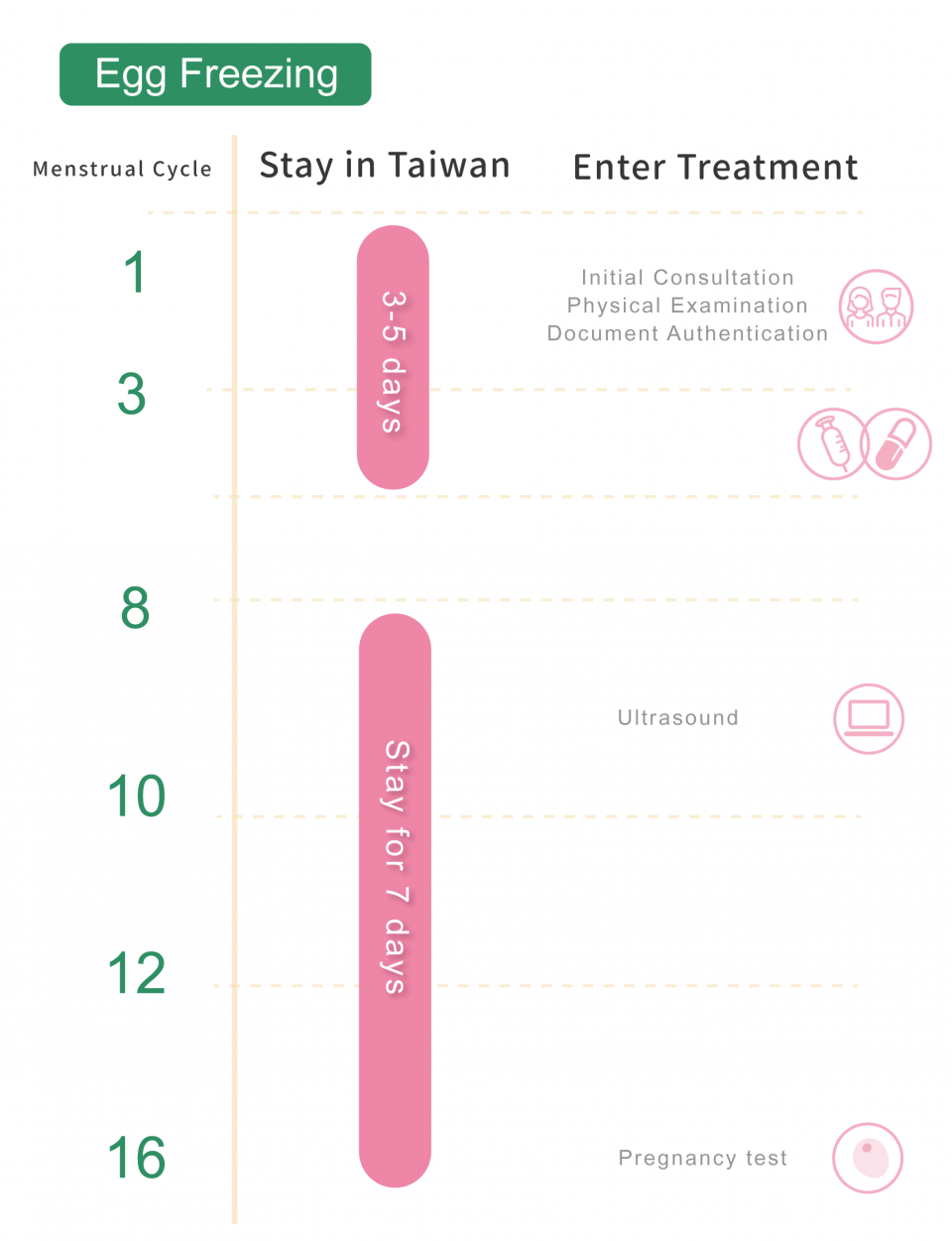
Freezing Technology for Egg Cryopreservation
The freezing and cryopreservation for human gametes has a history of several decades. As early as 1953, it was proven that sperm cryopreservation could achieve pregnancy through artificial insemination. However, due to the larger cell size of eggs and embryos, they were more susceptible to cell damage caused by ice crystal formatting during the freezing process. It wasn’t until 1986 that the 1st successful pregnancy with frozen eggs was reported.
The following are the suitable candidates for egg freezing:- Individuals who want to delay their family planning through cryopreservation.
- Egg donors.
- Individuals undergoing IVF treatment who are unable to obtain viable sperm.
- Patients who need to undergo treatment (such as chemotherapy) due to illness.
Frozen Egg Preserved: How Does It Work?
In recent years, the vitrification technique for freezing eggs has rapidly developed. This technique involves cell dehydration and ultra-rapid cooling, which effectively reduces the formation of ice crystals within the cells during the freezing process, significantly improving the survival rate of eggs and embryos after thawing.
As early as 1999, vitrification technology successfully froze human eggs and has since resulted in successful live births. Recent studies have also confirmed that the live birth rates of vitrified eggs are comparable to fresh eggs. Therefore, in 2012, the American Society for Reproductive Medicine approved the routine clinical use of vitrification technology. The freezing preservation of gametes and embryos has become a standard practice at Lee Women’s Hospital.Infographic of egg freezing vitrification technique
By utilizing the advanced vitrification technique, eggs are frozen and preserved, effectively reducing the formation of ice crystals and minimizing damage to the eggs. The frozen eggs are stored in liquid nitrogen at -196°C.Process Infographic 1 The eggs are placed in a vitrification solution, which dehydrates the cells to prevent the formation of ice crystals during the freezing process and minimize egg damage. 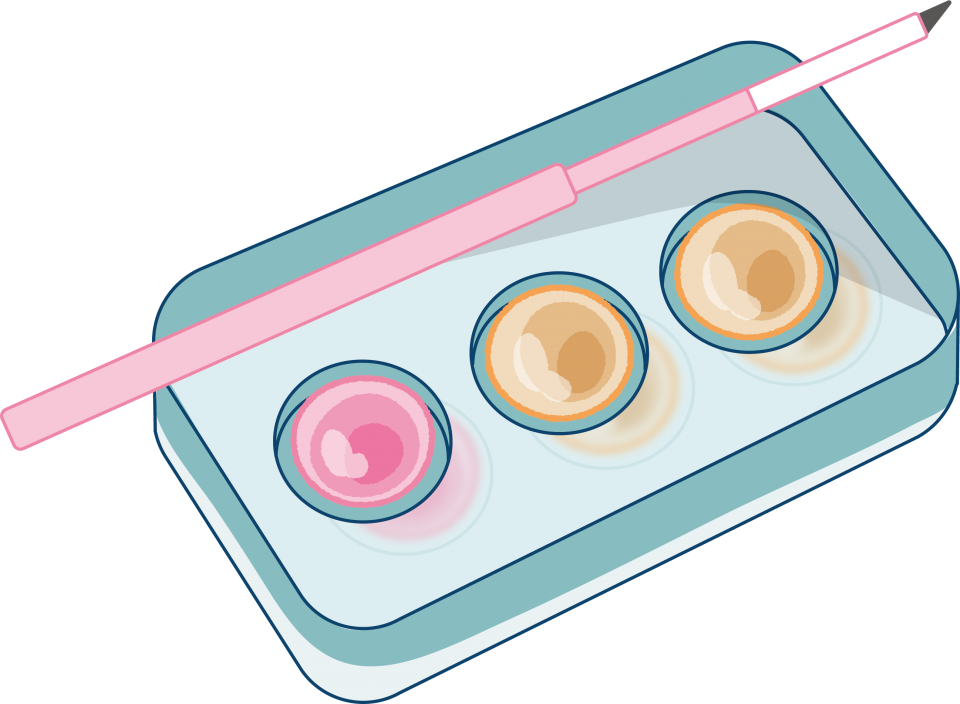
2 The treated eggs are transferred onto a freezing carrier along with a small amount of cryoprotectant. 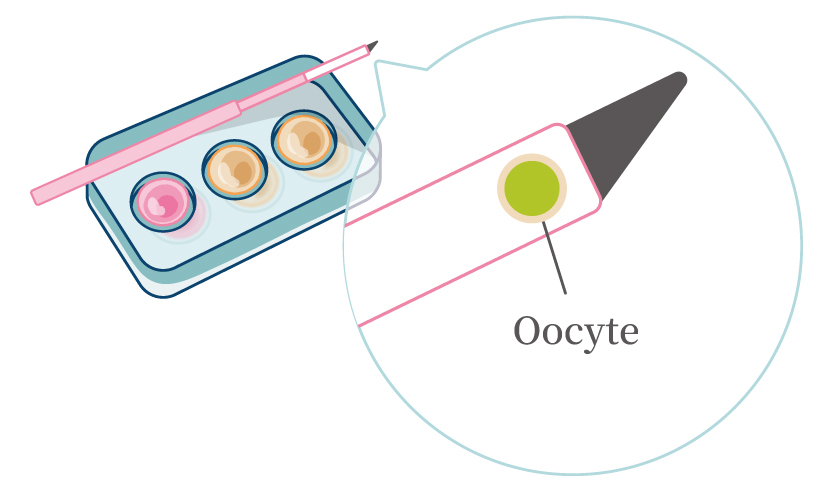
3 The processed eggs are rapidly immersed in liquid nitrogen and subjected to ultra-rapid cooling (approximately -23,000°C per minute), reaching a vitrified state. 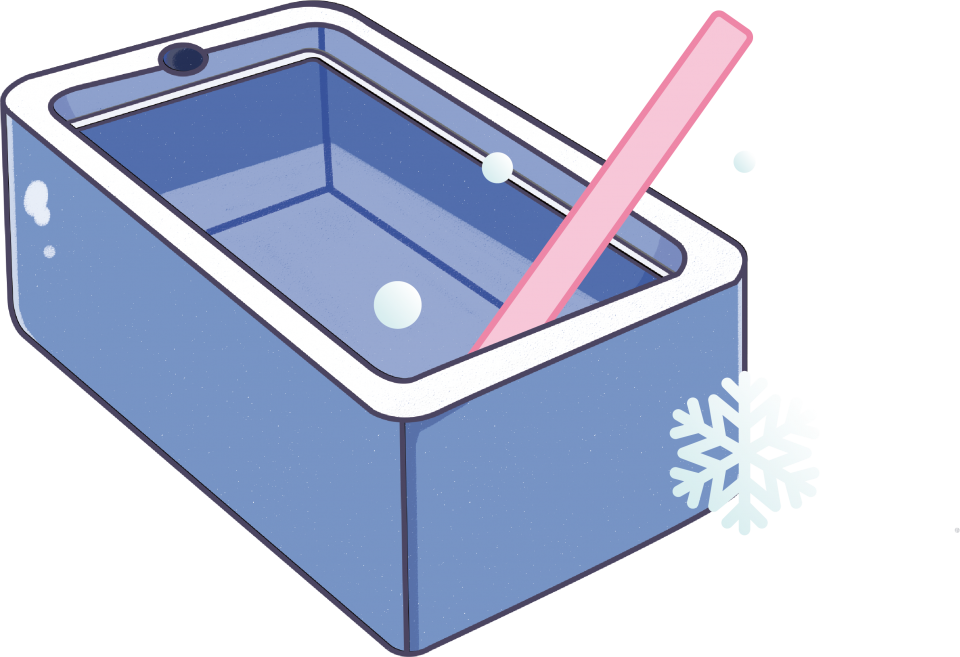
4 Carefully place the eggs inside a liquid nitrogen tank maintained at a temperature of -196°C. 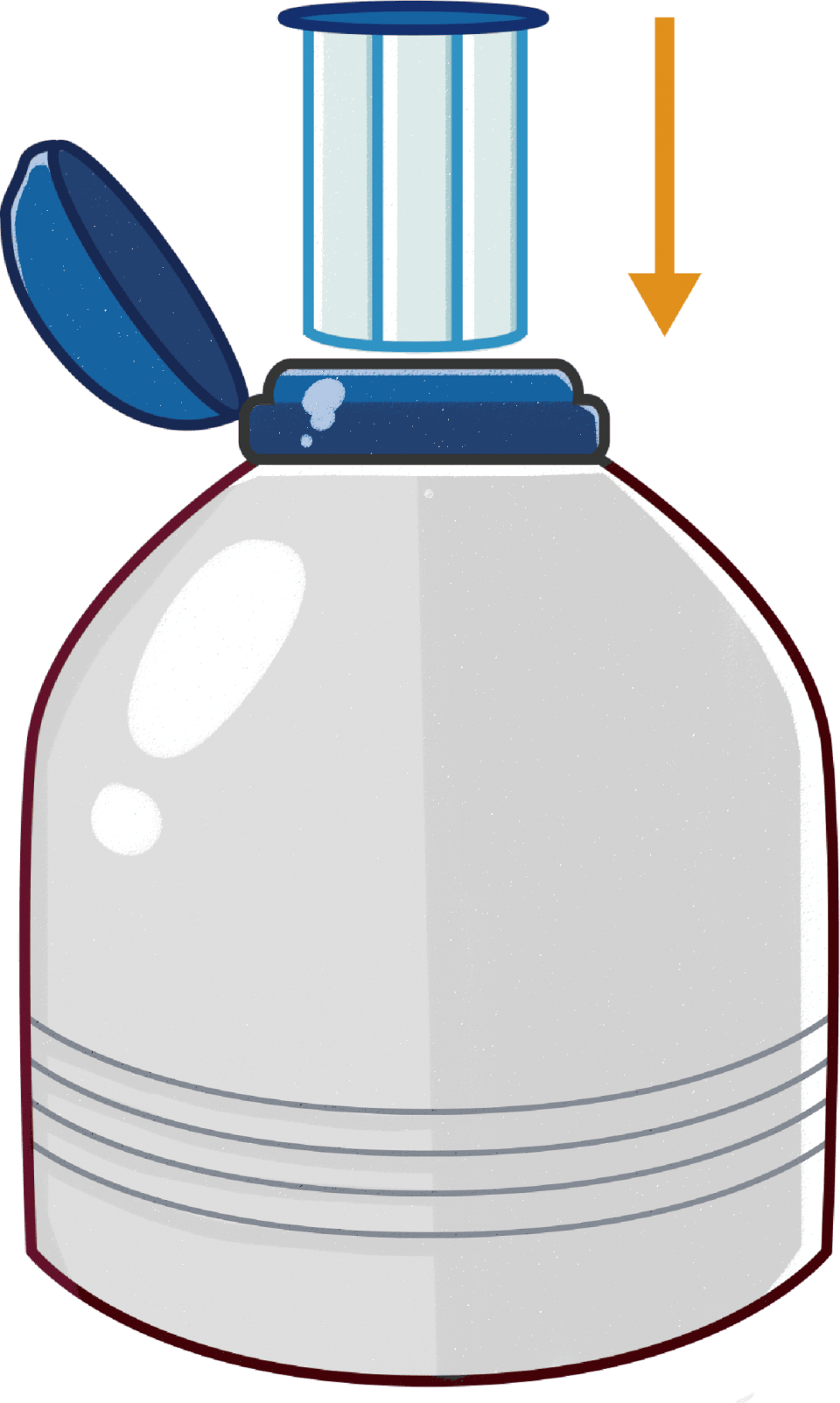
Postoperative Recovery for Egg Freezing
Lee Women’s Hospital provides a comprehensive postoperative recovery program to ensure the well-being and healing of women who have undergone egg freezing.Nourishing postoperative meals

LWH offers comforting and nutritious meals. The meals provided are of a 5-star confinement meal, ensuring a balanced nutrition for women after the procedure.- High-protein nutritional meal designed by dietitians
- Prepared with fresh ingredients
- Blood Tests:
-
Impact of Age on Egg Quality and Quantity
Egg Quantity and Female Age
A woman's fertility is closely tied to her physiological age, as the number of eggs she possesses is determined at birth. Young, healthy women not only have an ample quantity of eggs but also exhibit good egg quality with a lower probability of chromosomal abnormalities, resulting in a higher chance of pregnancy and childbirth. According to a research article published in the Reproductive Biomedicine Online, women are born with approximately one million follicles in their ovaries. By the time of puberty, they have around 400,000 follicles. However, after the age of 37, the number of follicles in the body starts to decline rapidly.
Egg Quality as the Main Factor Affecting Pregnancy Rate and Live Birth Rate
As women age, their ovarian function gradually declines, and the quality and quantity of their eggs cannot be reversed. According to The Assisted Reproductive Technology Summary 2020 National Report of Taiwan by the HPA, Ministry of Health and Welfare of Taiwan, the pregnancy and live birth rates decline with increasing age, especially after the age of 34.
Relationship between Age and Embryo Chromosomal Abnormalities Ratio
According to literature, as women reach the age of 35, the ratio of chromosomal abnormalities in embryos gradually increases. After the age of 38, the ratio of chromosomal abnormalities exceeds 50%.
FAQ: What is the difference in egg freezing timing between the ages of 30 and 40?
When to freeze your eggs? Based on the data above, if you want to maintain good egg quality, it is recommended to start planning egg freezing between the ages of 30 to 35. If you wait until utmost 40 when the number and quality of eggs decrease, the retrieved follicles may not be as healthy, resulting in a relatively lower live birth rate.
Get to Know your Ovarian Function
Female fertility is closely related to the ovarian function index. In fact, women can understand their “egg power” through simple medical examinations to assess their ovarian function. The methods to evaluate ovarian function include:
Blood test for AMH (Anti-Mullerian Hormone)
Blood test for FSH (Follicle Stimulating Hormone)
Transvaginal ultrasound examinationAMH
AMH, short for Anti-Mullerian Hormone, is secreted by follicles in ovaries and can indicate the ovarian follicle reserve. Ovarian function is an important factor affecting pregnancy and the success of IVF. The level of AMH is an indicator for predicting fertility. Therefore, checking the AMH index is also crucial in the process of IVF and assisted reproductive techniques.
* There may be variations in test results, and it is meaningful to accumulate 2-3 consistent results.AMH levels and corresponding ages AMH(ng/m) >3 2 1-2 1 <1 Avg. age <30 35 38 40 >43
*Avg. age may not necessarily correspond to actual age.
*AMH test can be taken at any time without fasting.
*Statistical data from 4,632 women who underwent AMH testing at Lee Women’s Hospital in the 2021 year.Distribution of female age and AMH value in 2021 Age AMH ≤1.2 ≤2 >2 Total ≤30 6.49%
(66)13.27%
(135)86.73%
(882)1,017 ≤35 9.58%
(240)19.32%
(484)80.68%
(2,021)2,505 ≤40 13.35%
(442)24.67%
(817)75.33%
(2,495人)3,312
FSH
During female adulthood, FSH initiates the growth and development of follicles. FSH can assess the status of the ovarian cycle and serve as an indicator of ovarian function.
*If taking hormonal medications, this test result may lack reference value.FSH standards FSH(ng/m) <10 10-12 >12 Ovarian function Normal Mild decline Severe decline
*Blood samples should be collected on the 3rd day of the menstrual cycle and does not require fasting.
Transvaginal ultrasound examination
Transvaginal ultrasound is used to evaluate any abnormalities in the uterine structure, track the growth of ovarian follicles, assess the condition of the uterine lining, identify fibroids, endometriomas, and adenomyosis.
FAQ: Which is more beneficial.”freezing eggs when young” or “directly pursuing IVF after many years” ?
Firstly, it is important to understand that the success rate of an IVF cycle is directly related to the maternal age. After the age of 37, the quality and quantity of eggs significantly decline, making it less likely to achieve successful egg retrieval in a single cycle. Based on clinical experience, most couples of advanced maternal age require multiple egg retrieval procedures during the IVF process to collect a sufficient number of high-quality eggs and embryos for implantation.
Freezing eggs before the age of 35 not only serves the purpose of preserving fertility but also reduces the likelihood of requiring repeated IVF cycles during subsequent attempts to conceive. It enhances the chances of achieving a successful pregnancy and delivery. -
Success Rate of Egg Freezing
Every woman who is considering egg freezing must have this question in mind: Is egg freezing really worth it?
The answer is: Yes, it is!
A woman's age has a significant impact on the quality and quantity of her eggs, with a rapid decline in the number of ovarian follicles after the age of 37. Egg freezing allows you to preserve your eggs in their current state. Lee Women's Hospital utilizes the vitrification technique for egg freezing, which is an excellent freezing method that helps maintain the quality of the eggs and reduces egg deterioration.
Currently, our hospital's egg bank stores over 20,000 eggs, with a post-thaw survival rate of over 90%. The pregnancy success rate for thawed eggs is nearly equivalent to that of fresh eggs of the same age. The highest pregnancy age achieved with frozen eggs is 45, proving that the quality of frozen eggs can be maintained even after several years.
This means that when you decide to prepare for pregnancy after 5 years of egg freezing, you don't have to worry about having a low ovarian reserve because you have the option to use younger eggs compared to the average woman.
How long can frozen eggs be preserved?
At Lee Women's Hospital, the eggs are preserved using vitrification technique in a constant temperature environment of -196°C liquid nitrogen. Technically, there is no time limit for preservation. However, according to the regulations of the Artificial Reproduction Act in Taiwan, a written application for extending the preservation period is required after 10 years of egg freezing.
How to achieve pregnancy after egg freezing?
Women who have undergone egg freezing have the option to achieve pregnancy naturally or through IVF. Based on medical advice, women over the age of 35 who have been trying to conceive for more than six months are recommended to seek consultation at a fertility clinic. For women who have frozen their eggs and choose to undergo IVF, the egg retrieval process can be skipped. Instead, the thawed eggs are fertilized with sperm to form embryos, which are then implanted in the uterus.
Women who have frozen their eggs do not need to worry about the impact of thawed eggs on pregnancy and the fetus. The success rate of thawing frozen eggs is over 90%, and there is no significant difference in embryo implantation rate and pregnancy rate compared to fresh eggs. The health and development of babies born from frozen eggs are comparable to those conceived naturally.
A Successful Story of IVF with Frozen Eggs: Welcoming New Life After Egg Freezing
"Why not wait until after marriage to do IVF? Why freeze eggs?"
"Is egg freezing worth it? What if the thawed eggs are all damaged?"
"Is it really worth spending on egg freezing?"
More and more people are realizing that "egg freezing" is a worthy consideration, allowing women to reduce the pressure of fertility. The value of egg freezing lies not only in "egg retrieval" and "freezing," but in the success rate of thawing the eggs, which is the core value of egg freezing.
The Lee Women's Hospital wants to share a story of egg freezing: Miss Ye, who froze her eggs at the age of 34, successfully thawed her eggs after 6 years and became pregnant.
Case Profile:
AMH (Anti-Mullerian Hormone) level: 2.1 before egg freezing
Uterine polyps
Family history of breast cancer
On Christmas Eve in 2014, Miss Ye stepped into the infertility department for the first time. At the age of 34, she came to Lee Women's Hospital for a consultation on egg freezing with Dr. Maw-Sheng Lee.
"At that time, I was already 34 years old, and my friends were slowly starting families and having children. I began to feel the pressure of time. Originally, I wasn't in a hurry. I was busy with my career, and I thought it wouldn't be too late to get married and have children a few years later. I considered egg freezing because I felt anxious about my ovaries after seeing news about Taiwanese supermodel freezing their eggs at fertility clinics. I realized that preparing for having children in advance is necessary. So, I started searching for obstetrics and gynecology clinics in Taichung."
Dr. Maw-Sheng Lee arranged a 2-week egg freezing treatment for Miss Ye. Throughout the treatment, she went through the following procedures:- Ultrasound examination: Observing the condition of ovarian follicles
- Ovulation induction injections: Stimulating follicle growth
- Egg retrieval trigger shot: Prepared for oocyte retrieval
- Egg retrieval surgery: Minimally invasive surgery to retrieve oocyte
Two days after the egg retrieval surgery, Miss Ye returned to Dr. Lee's clinic to receive the report for this egg freezing cycle. She successfully retrieved 11 eggs, and all 11 eggs were successfully frozen.
Frozen for 7 years, the babies arrive in this world.
Understanding the thawing success rate of LWH and the success rate of IVF with frozen eggs.
Five years later, after Miss Ye got married, she and her husband visited Lee Women's Hospital to consult with Dr. Chun-I Lee regarding preparing for pregnancy. During the examination, Dr. Chun-I Lee discovered multiple uterine polyps in Miss Ye's uterine cavity, which could potentially affect embryo implantation and pregnancy rates. Dr. Lee performed a polyp removal surgery using hysteroscopy for Miss Ye to address the uterine issue. With the uterine problem resolved, Miss Ye and her husband decided to attempt natural conception first.
Six months later, Miss Ye and her husband returned to Dr. Chun-I Lee's clinic. After detailed consultation and discussion, in May 2020, Miss Ye's eggs were ready to be thawed! The thawing success rate of eggs is very high, and the eggs were well preserved. Lee Women's Hospital combined Miss Ye's eggs with her husband's sperm, resulting in the creation of four D3 embryos and six D5 embryos. Based on Dr. Lee's professional judgment, four D3 embryos were selected for Miss Ye's IVF treatment, while the remaining six embryos were frozen.
The procedure of using frozen eggs for implantation is similar to conventional IVF. Dr. Lee scheduled the embryo transfer surgery for Miss Ye during the "implantation window." Two weeks after the transfer, on the day of the pregnancy test, the β-HCG level confirmed that Miss Ye was pregnant! Subsequently, Miss Ye visited Dr. Lee regularly for prenatal check-ups, where the two little hearts were seen beating inside her belly. In January 2021, at LWH, Miss Ye successfully gave birth to twin babies. The eggs frozen at -196°C seven years ago have now become two lively little babies.
"Freezing eggs is an investment worth making. I didn't know if I would get married and have children five years later, but I knew that I needed to freeze my eggs at that time because I deserve this happiness." -
FAQ: About Egg Freezing
FAQ: How much does egg freezing cost? What do you need to know before egg freezing?
A1:Q1: Who needs to freeze eggs? - Young women who have not considered pregnancy yet after the age of 34
- Before undergoing ovarian surgery, chemotherapy, or radiation therapy
- Women without a uterus or with impaired uterine function, waiting for the legal period of surrogate motherhood
- Women with a family history of premature ovarian failure or autoimmune diseases
- In cases where the husband cannot successfully obtain sperm on the day of egg retrieval or the husband has azoospermia, eggs can be temporarily frozen for later fertilization and embryo culture
A2: Two tests need to be done before egg freezing to confirm normal ovarian function:Q2: What tests need to be done before egg freezing? - Blood Tests:
- Anti-Müllerian Hormone (AMH) level, which indicates ovarian reserve.
- Follicle-Stimulating Hormone (FSH) level.
- Ultrasound Examination:Evaluation of the number of ovarian follicles.
A3: The approximate cost for ovulation induction, egg retrieval, and cryopreservation is around USD 4,500 t0 5,300. Additionally, there is an annual fee for the storage of frozen eggs.Q3: How much does egg freezing cost?
A4: Before egg freezing, it is important to carefully select an experienced and professional fertility facility. While some people may prioritize cost, it is crucial to consider not only the stage of retrieving and freezing eggs but also the viability of unfreezing the eggs in future. It would be regrettable to invest in egg freezing only to find out later that the unfreezed eggs cannot be used during the IVF treatment. Therefore, the most important factor is the technical expertise of the laboratory.Q4: What should be considered before egg freezing?
A5: Before egg freezing, it is important to carefully select an experienced and professional fertility facility. While some people may prioritize cost, it is crucial to consider not only the stage of retrieving and freezing eggs but also the viability of unfreezing the eggs in future. It would be regrettable to invest in egg freezing only to find out later that the unfreezed eggs cannot be used during the IVF treatment. Therefore, the most important factor is the technical expertise of the laboratory.Q5: What should be considered before egg freezing? FAQ: What will Happen During the Egg Freezing process?
A6: The egg freezing treatment typically takes 2-3 weeks, during which you may need to visit the clinic 3-5 times. Lee Women's Hospital offers a more patient-friendly approach where, under the evaluation of the physician, long-acting ovulation induction medications can be used to significantly reduce the number of injections and clinic visits. In some cases, the entire treatment may require only two doses of ovulation induction medication. If you have such a need, please discuss your medication plan with the attending physician.Q6: Do I need to receive injections every day?
A7: Normally, women produce only one mature egg per month. The egg freezing process involves stimulating the growth of multiple follicles in the ovaries using oral ovulation-inducing medication or ovulation induction injections. Generally, the impact on the body from egg freezing is minimal, and there are no long-term consequences. However, women with polycystic ovary syndrome (PCOS) may have a higher response to medications, which can potentially lead to ovarian hyperstimulation syndrome (OHSS). Therefore, for women with PCOS, the medication dosage is adjusted to minimize possible side effects.Q7: Are there any side effects or long-term consequences of egg freezing? Does it accelerate menopause?
A8: OHSS occurs more frequently in young, underweight women, those with polycystic ovary syndrome (PCOS), or those with more than 15 follicles in a single ovary. The incidence rate is approximately 0.5-2%. Some individuals may experience symptoms such as bloating, nausea, vomiting, dizziness, palpitations, decreased urine output, and weight gain. Mild cases can resolve on their own within a few days or be managed through outpatient care, while only a small number of severe cases require hospitalization for treatment.Q8: What is Ovarian Hyperstimulation Syndrome (OHSS)? Severity Symptoms Treatment Mild Bloating
Mild abdominal painSelf-observation
Outpatient monitoringModerate Abdominal pain
Nausea
Mild ascitesOutpatient monitoring Severe Intense abdominal pain
Vomiting
Ascites
Difficulty breathing
Hematocrit (Hct) > 45%
Low blood sodium
High blood potassium
Decreased urineHospital stay
A9: Egg freezing should ideally be started at a young age as younger eggs have a higher success rate for future IVF attempts, maximizing the benefits of egg freezing. Dr. Chun-I Lee suggests that the most cost-effective age for egg freezing is 34. As women exceed the age of 35, egg quantity and ovarian function decline significantly, while the proportion of abnormal embryo chromosomes increases. Therefore, preserving good quality eggs at a young age provides a better chance of generating higher-quality embryos when these precious eggs are needed in the future, resulting in a higher success rate for embryo implantation.Q9: How many eggs should be frozen for egg freezing?
Age <35 35-38 39-40 >40 Egg count 10 15 20 >20
A10: The egg retrieval procedure is scheduled for check-in between 5 am and 8 am. Fasting for 8 hours prior to the procedure is required (including water). After receiving sedation anesthesia through intravenous administration, the follicles and follicular fluid are extracted using an egg retrieval needle guided by transvaginal ultrasound imaging. The number of eggs retrieved may vary depending on individual conditions and medication response.Q10: How is the egg retrieval procedure performed? Is it painful?
The duration of the egg retrieval procedure is approximately 20 to 40 minutes. After the recovery from anesthesia, patients can leave the operating room. Most individuals can leave the hospital around 10 am, but it may vary depending on personal physical condition. The egg retrieval procedure is performed vaginally, and it only leaves a small puncture wound, which does not require stitches.
Since the procedure is performed under anesthesia, it feels like having a nap. In general, there is no sensation during the procedure. Some individuals may experience mild discomfort similar to menstrual cramps.FAQ: Post-Egg Freezing Care
A11: In the 1-2 weeks following the egg retrieval, you may experience discomfort due to medication stimulation, such as bloating, nausea, dizziness, palpitations, decreased urine output, and weight gain. However, these symptoms typically subside within a week, and your menstrual period will return around 8-10 days after the retrieval, resuming its regular pattern.Q11: How should I take care of my body after the egg retrieval procedure? - Engage in moderate exercise
- Supplement nutrients appropriately
- Maintain a positive mood
- Avoid overeating or imbalanced nutrition
A12: Currently, Lee Women's Hospital utilizes the latest rapid freezing technique (vitrification) for egg freezing. As a result, the post-thaw survival rate of eggs is approximately 90%, and the pregnancy success rate for thawed eggs is nearly equivalent to that of fresh eggs of the same age. The highest pregnancy age achieved with thawed eggs is 45 years, demonstrating that the quality of frozen eggs can be maintained for many years.Q12: How are the retrieved eggs stored? Does it affect egg quality?
A13: According to Taiwan's "Assisted Reproduction Act," there is no specified time limit for egg freezing. Therefore, eggs can be frozen for a lifetime!Q13: How long can frozen eggs be stored?
Although freezing eggs can extend the reproductive age, it cannot change a woman's physiological age. The younger the age at which the eggs are frozen, the higher the chances of successful live birth after thawing. However, if eggs are thawed and fertilized at an advanced age, the likelihood of age-related high-risk pregnancy complications such as preeclampsia, hypertension, diabetes, etc., still increases based on the age at implantation. Therefore, while there is currently no time limit for egg freezing, it is still recommended that women considering egg freezing do so before the age of 35 and complete childbearing before the age of 45.

